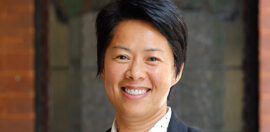Faith in Change
15 December 2014 at 10:55 am
After being CEO of the Muslim Women Association for the past 14 years, Maha Abdo has learned how to fight for the rights of the members of her community. Abdo is this week’s Changemaker.
When Maha Abdo came to Australia in 1970 she could not speak a word of English and she found herself in a country largely intolerant of immigrants.
 More than 40 years later she is still working to ensure that people know the facts about those from different cultural backgrounds.
More than 40 years later she is still working to ensure that people know the facts about those from different cultural backgrounds.
A proud Australian, Abdo says it is time for the whole country to move towards a culture of inclusion.
So tell us a bit about your background.
I was born in Tripoli, Lebanon, and came to Australia at the age of 12. I went to primary school here and then did all my education here.
My father had come here one year before and chose for us all to come here and settle here with him.
How many years ago did you arrive in Australia?
I came in June 1970 with my siblings.
What was it like being an immigrant from Lebanon living in Australia back then?
Well let me tell you, I didn’t speak a word of English because our language was Arabic and French. I spoke fluent French but I don’t have that anymore.
There was no support for English classes. There was nothing in those days. Because remember Australia had just sort of come out of the White Australia Policy so it was still a time where you couldn’t speak any language other than English anywhere in public.
I fully received a lot of support from my teachers at Primary School. The Principal of that day, and I remember him clearly God bless him, he was very, very supportive and he said to me “Within three months you are going to be able to speak English fluently.”
I thought “Me? No way.”
I remember though the first time I went into my classroom at Primary School and they were doing maths. They were doing long division. I looked it up and I thought “Oh my god, I can do this easily. I don’t even need to work at it.”
I remember not speaking a word of English but I put my hand up and I went up to the board and did it the way we did it back in Lebanon, which was very, very quick division.
The other students were saying “But she can’t speak English. How come she can do this?” I remember that my teacher said “Just because one can’t speak English doesn’t mean ones’ mind can’t solve many problems” and maths is one of those that goes beyond language.
From that I think my confidence came through. Even though we were bullied at school for not speaking English, you know, we were called wogs and all that.
But I think the difference was that the Lebanese were accepted as very good and very hard working people. We were proud to say “Yes I’m Lebanese.” Whereas now you’ve got the media that works against you.
So I think no matter what happened on the playground and no matter what happened when you were on the bus going to Bondi or going to town you still were respected really.
How was the Muslim Women’s Association Founded?
It was two other women that started the Association in 1983 and I came in a couple of years later.
We had no funding in the beginning and we were all working on a voluntary basis until 1988.
We were just doing little projects until 2000 when we did a whole business plan of the organisation and restructured and that’s when the position of CEO came up and when I took that job.
What was it that drew you to this kind of work?
We grew up with my father being very much part of the early settlers here. I saw him working tirelessly to establish the first mosque in Lakemba and the Lebanese Muslim Association.
Let me say clearly that I remember growing up and not seeing my father because he was working so hard to establish the infrastructure for the Lebanese community.
My first thought was “I’m never going to get involved with this, I don’t want this.”
But I think it’s instilled in our hearts to give back and I remember my father would always say “What you gain in knowledge you must pass on to others.”
So after I got married and my children were still young I was a home mum. I did a lot of work in my local school and then clearly I could see in the 80s there was something I needed to find about myself and my identity as an Australian Muslim woman.
So through that really, in my own search for myself, I turned back to the Muslim community.
Still I said I was not going to get involved with those people and the more I said it the more I realised I had to get involved. I had something that I wanted to give back.
There were things that I missed out on in my childhood where there were no support mechanisms for children growing up.
So it began by just doing activities with the children and from there I realised that we had to make things much more applicable to the youth.
That’s where my passion is. My passion is very much in making sure that young people’s voices are heard and that we’re providing alternatives for them.
We were the first in the Muslim community to organise a Muslim and leadership camp. We organised that in 1992 and we started with about 28 girls and a couple of years later we had to have a waiting list.
That sort of gave me the drive to be able to help the organisation to change it’s culture so that it is evolving according to the needs of the community.
We have a settlement services arm of the organisation which helps newly arrived migrants and women and children and families.
We have another wing for the elderly and the young people. We work a lot with women trying to escape domestic violence with their children.
That was my next question. What are you working on at the moment?
In service provision our main focus at the moment is domestic violence.
We’ve become a specialised service in multicultural services and service provision to families, women and children, escaping domestic violence.
A lot of people would have seen you recently involved in the debate over face coverings. How are you involved in that?
We do a lot of work on correcting misconceptions and highlighting the differences between cultural and religious practices.
On the issue of the burqa and the hijab, the organisation has been very much taking a leadership role in advocating the freedom for women to choose what they want to wear.
For the last decade or so, from the early days where Bronwyn Bishop started debating about it.
I actually debated her about it on national tv and she was atrociously rude. I remember saying to her that this is about freedom and choice and she said something along the lines of “Yes and the black slaves thought they were free.”
So I’ve been very much in the midst of all these debates.
Do you see the debate going away anytime soon or do you think it will continue to crop up every now and then?
Well I look at NSW and really here when this Government came on board they actually got in touch with the Muslim Women’s Association and I worked with the Minister on the legislation around head coverings so that it is clear and it won’t be debated anymore.
There are questions around what is a face covering and what do people do for security and safety purposes and we’re doing a lot of educational work with the NSW Government.
So I think if we could take that to a national level then that would put everyone’s mind at ease and they wouldn’t use that card again. They wouldn’t say “Yeah, let’s get those women,” and they wouldn’t use racism to breed fear around the Muslim community.
That’s what I’ve been advocating for. It’s worked really well here in NSW.
There was an Ombudsman Inquiry in the last 12 months to see how it was rolling out with all the authorities and it’s working really well because people know what’s expected of them and others know what to say.
As much as I was saying to people “This is what it is and there is nothing to be afraid of,” we had to have it in writing and it had be in the legislation. So let’s do a national one.
It has to be in collaboration with Muslim women because we know what the issues are and we know what will work.
We’ve put our hand out and said come work with us but all they’re interested in is breeding fear.
What is the biggest reward you get out of it?
I think it’s making a difference on all fronts.
When I know I’m not withholding that information, I’m sharing as much as I can. And I think by sharing I get so much back out of it because I make so many new friends and then I see people are very, very positively responding.
I feel like I’m a tool for opening doors between us and the rest of mainstream Australian society.
What do you consider your greatest achievement to be?
I think it is clearly highlighting the differences between religious and cultural differences within Islam and very much the advocating and promoting the respect of all women. Specifically in the field of domestic violence.
Because there was a lot of cultural influences and bringing domestic violence forward as a topic to be spoken about without that stigma is an achievement.
What’s your favourite saying?
“Things are not always what they seem to be.”
We must always find out what it is we can’t see because we learn through the process. The magic is through the learning and the process, not through the end result.
And that’s why I say you can’t see the end now because right you can see pain but as you walk through that process there will be relief at the end of that road.
What’s something you’re always being asked?
It’s actually a statement. I always get told, “You’re not like the rest of them. You’re different from the real Muslims.”
They’re saying “You’re not the Muslim that I want to talk to, I want to talk to the Muslims that I see on TV.” But they’re only seeing a small splinter group and actually I am part of the majority.
What’s your ultimate goal that you want to achieve through the work you’re doing?
My ultimate dream is that there will be a day where we wont talk about religious affiliation or ethnic background in a negative way.
We will see each of us as one people that belong to humanity. It doesn’t matter what background we have, we are all one humankind.
What did school teach you?
My early days I learned respect, compassion and trust because that’s what was shown to me in the early days by my teachers.
Teachers were not just teachers. They had that power to influence in a good way.
What or who inspires you?
In this world my father inspires me. His name is Hisham Krayem.
He’s an inspiration. He’s my rock.
But from my Islamic teachings it is one of the wives of the prophet, her name is Khadigeh.
Her aspirations and her commitment to humanity. She was a business woman, a wife and a leader and I learned how to be what I needed to be in each situation without fearing that I’m a hypocrite.
As a mother I am not the same as being a community leader, I am not the same as being a wife.
So I learned just how to be what I need to be.







